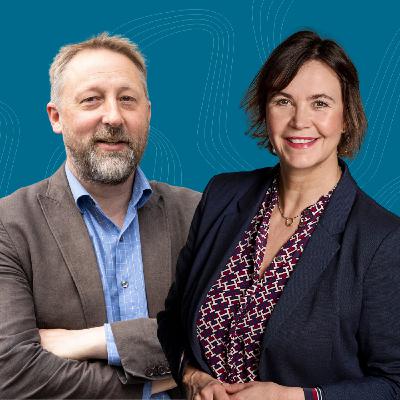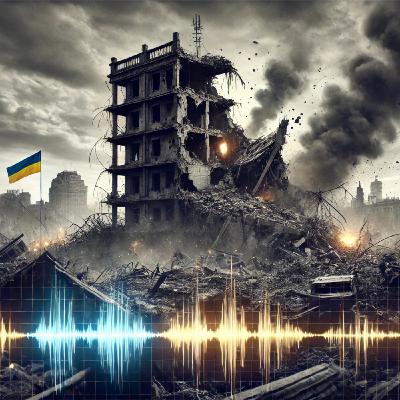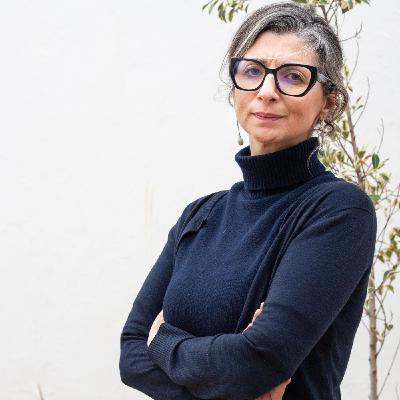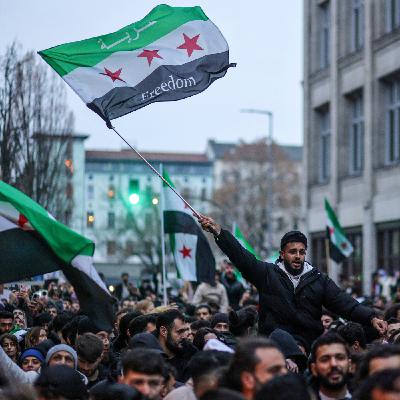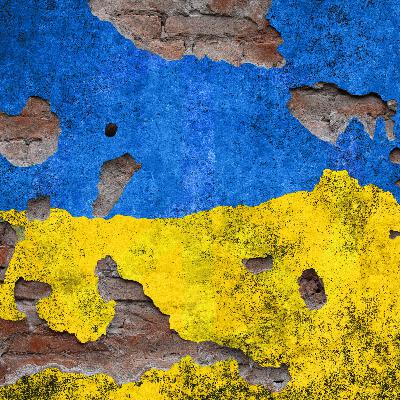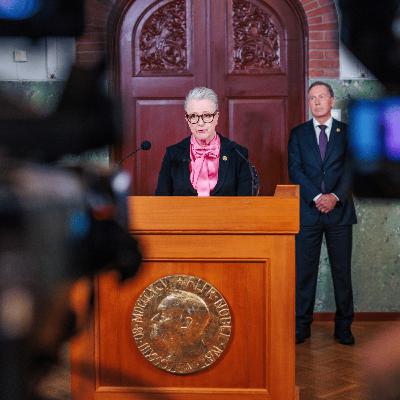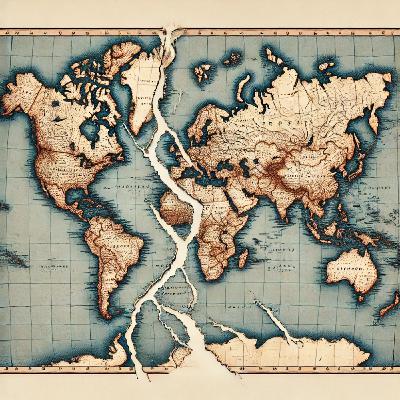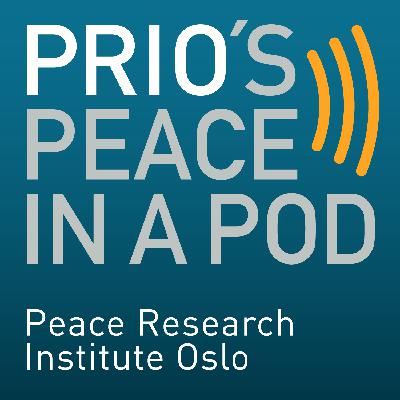Discover PRIO's Peace in a Pod
PRIO's Peace in a Pod

PRIO's Peace in a Pod
Author: Peace Research Institute Oslo
Subscribed: 38Played: 1,114Subscribe
Share
© Peace Research Institute Oslo
Description
How can we explain peace and conflict in the world? What do security and insecurity do to a region and its people? How do different kinds of violence affect people, and how do societies tackle crises – and the threat of crisis? The Peace Research Institute Oslo brings you expert opinions on the headlines, personal stories from the field, and cutting-edge research in this monthly podcast, hosted by Emmy-award winning journalist Arnaud Siad.
Hosted on Acast. See acast.com/privacy for more information.
111 Episodes
Reverse
January 2026 has barely begun, yet the pace of global upheaval is already staggering.In just a few weeks, the United States has seized Venezuela’s president Nicolás Maduro, issued threats against allies, and signalled a willingness to reshape the world order.At the same time, international law and human rights are under unprecedented strain – from Ukraine to Sudan, from Gaza to Iran. Ceasefires fail to end the violence. Humanitarian organisations are expelled. Journalists and academics are silenced.As 2026 begins, a fundamental question looms: are we witnessing a temporary crisis of the international system – or its steady unravelling?In this episode, Agnès Callamard, Secretary General of Amnesty International and former UN Special Rapporteur, and Jørgen Jensehaugen, Research Professor at the Peace Research Institute Oslo and a leading expert on the Israeli–Palestinian conflict, examine the erosion of global norms, accountability, and multilateral institutions – and ask what, if anything, can still hold the system together.PRIO’s Peace in a Pod is hosted by Arnaud Siad.Photo: Getty Images/Europa Press Hosted on Acast. See acast.com/privacy for more information.
After nearly a decade as PRIO Director, Henrik Urdal has wrapped up his tenure. Taking over is Nina Græger, who returns to PRIO after leading the Department of Political Science at the University of Copenhagen.In this special episode of PRIO’s Peace in a Pod, host Arnaud Siad sits down with both leaders for a wide-ranging conversation about what it means to steer a peace research institute in a time of global turbulence.Henrik reflects on his years at the helm - the challenges, guiding values, and what makes PRIO unique. Nina shares her vision for the institute and the role of peace research in an era marked by resurging conflict, rising defense budgets, and shifting geopolitical alliances. Hosted on Acast. See acast.com/privacy for more information.
2024 marked one of the most violent years since the end of the Cold War, with 61 armed conflicts recorded across 36 countries. This sobering tally comes from PRIO’s latest Conflict Trends: A Global Overview report, drawing on data from the Uppsala Conflict Data Program.But behind the numbers lies a deeper human toll. From Gaza to Sudan, children are among the most vulnerable in today’s wars - facing displacement, trauma, and the collapse of education and health systems.In this episode, we speak to Inger Ashing, CEO of Save the Children, about what it means to protect childhood in the midst of war. And to Siri Aas Rustad, Research Director at PRIO and lead author of the report, who walks us through the data and its implications.PRIO's Peace in a Pod is hosted by Arnaud Siad.Photo: Getty Images. Hosted on Acast. See acast.com/privacy for more information.
The European Commission has unveiled a bold 800 billion euro plan to ramp up defense spending - marking what many are calling a historic shift in Europe’s security architecture. With the United States signaling a more distant role under the Trump administration, Europe is under growing pressure to stand on its own.Is this a turning point for NATO? Can Europe match the military and strategic weight of other global powers? And what might this shift mean for the values that have long underpinned the Western alliance?In this episode, host Arnaud Siad is joined by Kori Schake, Director of Foreign and Defense Policy at the American Enterprise Institute and former foreign policy adviser to President George W. Bush, and Bruno Oliveira Martins, Senior Researcher at PRIO, to unpack the changing transatlantic relationship and what lies ahead for Europe’s security future.Photo: Thierry Monasse/Getty Images Hosted on Acast. See acast.com/privacy for more information.
Negotiations around a ceasefire in Ukraine have dominated headlines ever since Donald Trump returned to the White House. From bilateral talks in Saudi Arabia to direct talks between Trump and Vladimir Putin, discussions are intensifying over what a potential ceasefire could look like.But on the ground, the fighting continues. Ukraine’s energy infrastructure remains under attack, and civilians are still caught in the crossfire.Now, a breakthrough technology developed by the Peace Research Institute Oslo (PRIO) and NORSAR—using seismic and acoustic detection to automatically identify events—could transform how war crimes are documented and how ceasefires are monitored.Joining this episode are Sebastian Schutte, a Research Professor who leads the project at PRIO, and Oleksandra Matviichuk, head of the Center for Civil Liberties in Kyiv, who works tirelessly to document war crimes committed by Russian forces.PRIO’s Peace in a Pod is hosted by Arnaud Siad.Image: ChatGPT (DALL·E) / OpenAI Hosted on Acast. See acast.com/privacy for more information.
President Donald Trump’s call for the U.S. to take control of Gaza and displace its population marks a stark break from decades of American policy—one that could destabilize the entire Middle East.This comes at a critical moment, as the fragile Israel-Hamas ceasefire hangs in the balance and families await the return of hostages from Gaza. For Palestinians, the threat of another forced displacement is not only terrifying but a clear violation of international law.So what happens next? And what are the broader consequences for the region?In this episode, UN Special Rapporteur Francesca Albanese and PRIO Senior Researcher Jørgen Jensehaugen break down the stakes, the legal implications, and the realities on the ground.PRIO’s Peace in a Pod is hosted by Arnaud Siad.Photo: Chedly Ben Ibrahim/NurPhoto via Getty Images Hosted on Acast. See acast.com/privacy for more information.
December 8th. Syrian President Bashar al-Assad is reported to have fled the country his family ruled for 50 years—a political earthquake that sends shockwaves across the globe.Miles away in Europe, thousands of Syrians in the diaspora gather spontaneously to mark this historic moment. Governments react swiftly—many freezing asylum claims, while some begin drafting plans for the return of refugees.In this two-part episode, we first hear from Alaa Same, a Syrian refugee now settled in Norway. He shares his extraordinary story of escaping Syria, finding his way to Oslo, and the moment he learned that the dictator who had ruled his country for decades was finally gone.Then, we turn to two leading experts on migration and refugees: Marta Bivand Erdal, Research Professor at PRIO, and Pål Nesse, Senior Adviser to the Norwegian Refugee Council.PRIO's Peace in a Pod is hosted by award-winning journalist Arnaud Siad.Photo: Getty Images/Omer Messinger Hosted on Acast. See acast.com/privacy for more information.
The stakes are rising in Ukraine as Russian attacks on critical infrastructure intensify, plunging the country into darkness with rolling blackouts.Meanwhile, the Biden administration makes its final push to arm Kyiv before leaving office, and President-elect Donald Trump signals a potential shift in U.S. policy, raising critical questions about the future of the conflict.In this episode of PRIO’s Peace in a Pod, host Arnaud Siad is joined by Kristian Berg Harpviken, research professor at PRIO and the future Head of the Norwegian Nobel Institute, and Dr. Sabine Fischer, a Russia expert at the German Institute for International and Security Affairs, to discuss Ukraine’s war at this pivotal moment and what lies ahead.Picture: Getty Images. Hosted on Acast. See acast.com/privacy for more information.
Donald Trump’s return to the White House raises urgent questions about the state of American democracy.His contentious victory—despite ongoing legal battles and investigations into his role in efforts to overturn the 2020 election—marks one of the most polarizing comebacks in U.S. political history.What does Trump’s presidency mean for the future of American democracy, civil resistance, and global governance?In this episode, Harvard professor Erica Chenoweth, who delivered PRIO’s Annual Peace Address, joins PRIO Research Professor Scott Gates and Research Director Marianne Dahl to unpack the implications of this historic moment.PRIO's Peace in a Pod is hosted by Arnaud Siad.Photo credit: Getty Images/Chip Somodevilla Hosted on Acast. See acast.com/privacy for more information.
The Nobel Peace Prize is one of the world’s most prestigious honors. Each year, the Director of the Peace Research Institute Oslo (PRIO) presents his own independent list of individuals and organizations he believes are deserving of the Prize.This list, separate from the official selection by the Norwegian Nobel Committee, highlights those who have worked tirelessly for peace and merit special recognition.In this episode, PRIO Director Henrik Urdal discusses the people and organizations who made it onto his list this year. He is joined by Berit Reiss-Andersen, Special Adviser to the Norwegian Red Cross and former member of the Norwegian Nobel Committee, where she served for over a decade. Also featured is Maria Ressa, the 2021 Nobel Peace Prize laureate, honored for her courageous work alongside Russian journalist Dmitry Muratov in defending freedom of expression.PRIO's Peace in a Pod is hosted by Arnaud Siad.Photo credit: © Nobel Prize Outreach. Photo: Geir Anders Rybakken Ørslien Hosted on Acast. See acast.com/privacy for more information.
On April 29th at the World Economic Forum, Norway’s Foreign Minister, Espen Barth Eide, delivered a striking critique of the so-called “West,” accusing his allies of a double standard in their handling of the conflicts in Ukraine and Gaza. His remarks echoed growing criticism from the Global South, and highlighted the risk of eroding multilateral institutions and international law. But is there truly a double standard? And what new global alliances could emerge as the United Nations struggles with paralysis? In this episode, Stein Tønnesson, Research Professor Emeritus and former Director of PRIO, and Gérard Araud, former French Ambassador to the UN and the United States, explore what “the West” means today and how global governance might evolve in the future.This episode is hosted by Arnaud Siad. Hosted on Acast. See acast.com/privacy for more information.
More armed conflicts took place in 2023 than in any other year since the end of World War II. That is the shocking finding in this year’s Conflict Trends Report – a yearly paper by the Peace Research Institute Oslo, using data from the Uppsala Conflict Data Program and examining global conflict trends since 1946. In total, 59 armed conflicts raged around the world last year. So is our world becoming more violent? What were the most violent conflicts in 2023? And are these figures a coincidence of overlapping conflicts, some extraordinarily lethal, from artillery warfare in Ukraine to the razing of Gaza? Siri Aas Rustad is a Research Director at PRIO and the author of the Conflict Trends Report. In this episode, she is joined by Richard Gowan, the United Nations Director for the International Crisis Group, and an Associate Senior Policy Fellow at the European Council on Foreign Relations. PRIO's Peace in a Pod is hosted by award-winning journalist Arnaud Siad. Hosted on Acast. See acast.com/privacy for more information.
For decades, Norway has played a major role as a peacemaker. From the Nobel Peace Prize to the Oslo Accords, promoting peace has been a central aspect of Norwegian foreign policy.But this is only part of the story. Few outside the country are aware of the thriving, lucrative, and government-owned weapons industry in this Scandinavian nation.This creates a dilemma for Norway, as it walks a tightrope between economic interests and its commitments to international law.In this episode, Nic Marsh, a Senior Researcher at PRIO and a specialist in arms trade, discusses the scope and significance of Norway's weapons industry and arms trade. He is joined by General Kristin Lund, a retired senior officer of the Norwegian Army and the first woman to command a UN peacekeeping operation.The episode is hosted by award-winning journalist Arnaud Siad. Hosted on Acast. See acast.com/privacy for more information.
As tensions continue to rise in the Middle East, two women's organizations are pushing for a return to negotiation and a permanent resolution to the conflict.“Women Wage Peace” is the largest grassroots peace movement in Israel, while its Palestinian counterpart, “Women of the Sun,” is a Palestinian women's organization based in Bethlehem.They are part of a global movement to ensure women are not just represented, but also at the leadership table in peace negotiations.Their work is supported by research showing that involving women significantly increases the chances of achieving enduring peace agreements.In this episode, Xanthe Scharff, a gender expert, writer, and co-founder of The Fuller Project, a nonprofit organization dedicated to groundbreaking reporting on women, tells us about her reporting on these two women’s organizations.She is followed by Torunn L. Tryggestad, PRIO’s Deputy Director who heads its Centre on Gender, Peace, and Security, and Professor Azza Karam, a specialist in religion and development, and the keynote speaker at this year’s UN High-Level Seminar on Gender and Inclusive Mediation Processes, held in Oslo.PRIO’s "Peace in a Pod" is hosted by award-winning journalist Arnaud Siad. Hosted on Acast. See acast.com/privacy for more information.
As Russians headed to the polls this month, the reelection of Russian President Vladimir Putin was not in doubt.On March 17th, with over 87% of the votes in his favor, Putin secured a fifth term, becoming the longest-serving leader of the Federation since Soviet dictator Joseph Stalin. With most opposition candidates either dead, jailed, exiled, or barred from running, the path was clear, with no credible challenger to his rule.Echoing this landslide victory, polls in Russia seem to indicate Putin enjoys real domestic support, with 86% approving of the President, according to the Levada Centre, a respected Russian pollster.So beyond these official figures, what do Russians really make of their leader? And is support for the war in Ukraine as strong as the Kremlin claims?In this episode, we talk to Aleksei Miniailo, a political activist in Moscow, who started a project with social scientists and analysts to find out how the war with Ukraine is really being perceived in Russia. Pavel Baev, a Research professor at PRIO and an expert on Russian foreign policy, also joins the conversation.PRIO's Peace in a Pod is hosted by award-winning journalist Arnaud Siad. Hosted on Acast. See acast.com/privacy for more information.
UNRWA is in trouble. The UN agency for Palestine Refugees is accused by Israel of being infiltrated by Hamas and having had some of its staff involved in the attacks on October 7th.Nearly 2 million people in Gaza depend on UNRWA for survival as war and displacement continue after nearly four months of war.The allegations by Israel concern a fraction of the workforce in Gaza, but are having devastating consequences for the organization, threatening its very existence.While an investigation into Israel’s claims is ongoing, the United States, Germany and Sweden – the largest individual donors to UNRWA - have all paused their funding, and the European Union is wavering over what to do. However, Norway, one of the largest donors to UNRWA, says it will continue its funding.In this episode, UNRWA Commissioner-General Philippe Lazzarini, Norwegian State Secretary Andreas Motzfeldt Kravik, and Jørgen Jensehaugen, a PRIO expert on the Arab-Israeli conflict, discuss why the organization matters more now than ever.The episode is hosted by Arnaud Siad. Hosted on Acast. See acast.com/privacy for more information.
From war-torn Ukraine and Sudan to the Mediterranean, 2023 marked yet another year where thousands were forced to leave their homes in pursuit of a better life.In one of the deadliest migrant boat tragedies, more than 600 people drowned on June 14 off the coast of Greece, after a fishing vessel known as the Adriana capsized and sank. A few months later, the minuscule Italian island of Lampedusa saw an influx of 10,000 individuals within days, which nearly doubled the local population. It created new urgent humanitarian needs, on an island that has already welcomed and seen thousands pass through over the years, while again fuelling a narrative by fringe political parties of an "invasion."But beyond the gripping headlines, what were some of the key migration trends that defined 2023? What realities do those embarking on the journey to Europe face? And amidst the turmoil, are European initiatives aimed at curbing migration proving effective, and at what moral and financial costs?In this episode, we hear from Maria Gabrielsen Jumbert, a Senior Researcher at PRIO and an expert on migration and humanitarian issues. She is joined by Nima Elbagir, CNN's multi-award-winning Chief International Investigative Correspondent, who just returned from an assignment in the West Bank. Nima is in Oslo to deliver PRIO’s Annual Peace Address.This episode is hosted by Emmy-award winning journalist Arnaud Siad. Hosted on Acast. See acast.com/privacy for more information.
On November 15th, Israeli forces stormed al-Shifa Hospital, the largest medical complex in the Gaza Strip, in search of a Hamas base.The facility sheltered hundreds of people: wounded civilians, children, and newborns. Soon after, the World Health Organization labeled the hospital a "death zone."Healthcare facilities enjoy special protections under international law. However, from Gaza to Ukraine, and in many other places, evidence suggests that hospitals are routinely viewed as mere military targets.So, how does international law safeguard healthcare facilities, and why is it often insufficient to protect hospitals and healthcare workers?Larissa Fast, a PRIO Global Fellow and Professor of Humanitarian and Conflict Studies at the Humanitarian and Conflict Response Institute, University of Manchester, joins this episode as the Principal Investigator on the project 'Researching the Impact of Attacks on Healthcare.' She is accompanied by Tobias Köhler, a specialist in international humanitarian law with the Norwegian Red Cross, who has served in legal and protection roles for the International Committee of the Red Cross and the Norwegian Refugee Council.This episode is hosted by Emmy Award-winning journalist Arnaud Siad. Hosted on Acast. See acast.com/privacy for more information.
On November 15th, the world watched as a highly anticipated meeting between Chinese leader Xi Jinping and US President Joe Biden took place amid the scenic backdrop of Woodside, California. From a controversial visit by a US House Speaker to Taiwan, to a Chinese spy balloon crossing the United States – the two countries’ relations have sunk to their lowest point in decades. And from the war in Ukraine to the conflict opposing Israel and the Palestinians, and a general election in Taiwan that could decide the fate not just of the island, but the entire region – a more assertive Beijing may be attempting to redefine the rules of the game. As the country marks the end of its presidency of the UN Security Council this November, we ask a simple question: what does China want? Ilaria Carrozza is a Senior Researcher at PRIO and an expert on Chinese foreign policy. She is joined from Beijing by Zichen Wang, a Chinese public intellectual with the Center for China and Globalization, and the founder and editor of newsletter Pekingnology.This episode is hosted by Emmy-award winning journalist Arnaud Siad. Hosted on Acast. See acast.com/privacy for more information.
In the early hours of October 7, Palestinian militants with Hamas, the Islamic group that controls the Gaza Strip, mounted a stunning and highly coordinated invasion of Israel. They rampaged through Israeli towns, killing people in their homes, attacking young rave-goers, and taking some 200 hostages. The attacks by Hamas were horrific and gruesome, some of them live-streamed on social media for maximum impact. These were soon followed by Israel declaring war on Gaza, announcing a complete siege and starting a relentless campaign of bombardments that has killed thousands of civilians, flattened entire neighbourhoods and unleashed a humanitarian catastrophe. Western leaders were quick to respond to the attacks by Hamas with France, Germany, Italy, the United Kingdom and the United States issuing a joint statement, expressing their "steadfast and united support to Israel” and vowing to “support the country in its efforts to defend itself.”But beyond the unified front, a number of Western countries are voicing concerns about giving Israel carte blanche in Gaza, while UN Secretary General Antonio Guterres calls for a ceasefire. PRIO Senior Researcher Jørgen Jensehaugen, a specialist on the Arab-Israeli conflict and Jan Egeland, Secretary-General of the Norwegian Refugee Council who has teams on the ground in Gaza, discuss the West’s response to the conflict, and what the situation is like for the millions of Palestinians there. PRIO's Peace in a Pod is hosted by Emmy-award winning journalist Arnaud Siad. Hosted on Acast. See acast.com/privacy for more information.



